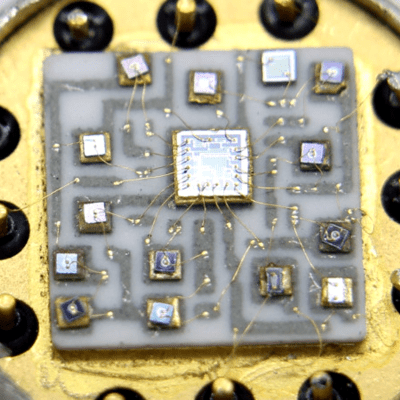
We thought it was time to give the analog side of Hackaday their chance to shine, and what’s the quintessential analog IC? The op amp! Whether you’re doing tricky signal conditioning, analog computations like it’s 1960, or just making music sound good, op amps are at the heart of many designs. This contest, starting right now, is your chance to show off what you can do with a good op amp, or a few.
And for everyone else, here’s your chance to dip your toes into the warm analog waters. Whether you’ve always wanted to build a Chua’s chaos circuit or just to listen to music, there’s probably an op-amp project that will fit your personal bill. All you have to do to enter is set up a project on Hackaday.io, and use the pull-down menu to enter. We welcome shows of op-amp bravado, naturally, but we’re also stoked to see your simple projects that might help our digital friends leave their world of black and white, and enter into the shades of grey.
Thanks to Digi-Key, our sponsor for the challenge, there are three $150 shopping sprees on the line for the winners. And as always, there are some honorable mention categories to help whet your analog whistle, and to give us an excuse to feature a lot of great projects. You’ve got until June 6, to get your entry in, but these aren’t necessarily simple builds, so get going now.
Honorable Mention Categories
- Hyper-Precise: If your project calls for, and realizes, high analog precision, we’ll consider it here. Miniscule offset voltages? Ultra-low input current? Crazy slew rates? Show off your most demanding applications here.
- Oddballs: This is the category for those of you who want to stretch out and try to make op-amps do things that they’re not normally meant to do. We’ve seen them used as motor drivers, for instance. We’ve also seen our share of magic smoke. What’s the strangest op amp circuit? We want to see it.
- The Classics: This category is for the op-amp applications that are the opposite of the oddballs. Standard situations where an op amp fits like a glove. Part of the value here is in showing folks who are new to designing with op amps where their power lies. Of course we expect to see traditional op-amp circuits here, but surprise us!
The Idea Fountain

Hard to believe in the digital age, but op amps were once used for math. Multiplication is just voltage gain by any other name, and addition and subtraction are just a matter of picking which pins you use. If you want a real challenge, you can try your hand at an analog computer, or take on a simpler challenge: converting Celsius to Fahrenheit.
Perhaps the op amp’s natural habitat these days is in audio, and there are no shortage of great microphone designs that use them to good effect.
And if you really want to master the op amp, you can always make your own.
Need to brush up on your op-amp theory? For the basic intuition, we really like this video introduction. Al Williams wrote a great piece on op amp simulation, if you don’t like to prototype in solder. And finally, our own Robin Kearey’s piece on the most superlative op amps is a must-read.
The Fine Print
- All designs must do something with op amps.
- All entries must be documented with at least a schematic and a demo of the circuit working. Quality of documentation will be considered by the judges.
- All entrants must agree to have the design published on Hackaday.
- Employees and contractors of Digi-Key, Supplyframe, Siemens and their immediate family members are ineligible to win, but are still encouraged to enter.
- Rules and categories subject to change. Judges’ decisions are final, but we strive to be fair.
So get to work on your op-amp containing project today! We can’t wait to see what you come up with. Thanks again to Digi-Key for sponsoring!
(And if you’re waiting for the announcement of the winners of the Low Power Challenge, come back this time tomorrow!)
Analog Anoraks: The Op Amp Contest Starts Now!
Source: Manila Flash Report
0 Comments